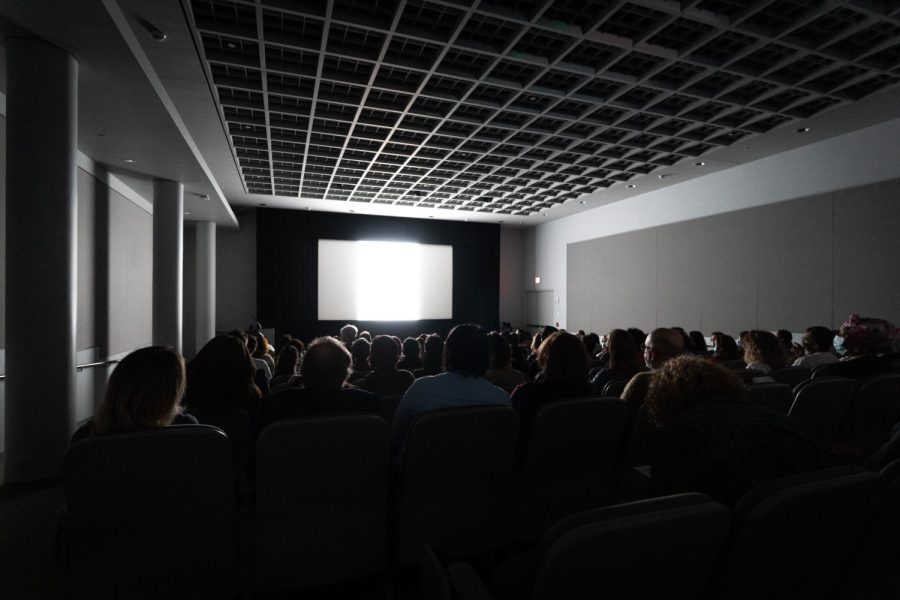NU alum and filmmaker Marion Hill tackles intimacy, lost love and polyamory with ‘Ma Belle, My Beauty’
Jonah Elkowitz/The Daily Northwestern
Audience watch a film in The Block Museum. The museum screened “Ma Belle, My Beauty” and featured a filmmaker Q&A at the Block Museum with Marion Hill Friday evening.
May 17, 2022
Filmmaker Marion Hill (Communication ’16) presented their film “Ma Belle, My Beauty” at the Block Museum of Art on Friday.
The Department of Radio, Television and Film, its advanced directing program, Studio 22 and the Department of Gender and Sexuality Studies sponsored the event.
“Ma Belle, My Beauty,” which won the 2021 Audience Award winner at Sundance, tells the story of Lane, Bertie and Fred, a former polyamorous couple who reunite in Southern France. The film depicts an attempted rekindling of lost love, complex intimacy and nuanced experiences of jealousy and passion. According to Hill, the film presents queer relationships as context rather than conflict.
“The main intention was just to show some honest, complicated stuff that felt close to me,” Hill said. “I was definitely not interested in queerness being the conflict of the story or polyamory being the conflict of the story.”
Honesty is a driving force in Hill’s storytelling, they said. Hill said “Ma Belle, My Beauty” aimed to show raw, messy truths about love and relationships.
While film critic Boyd van Hoeij criticized the film’s script, he lauded how Hill avoided sensationalizing polyamory.
“Stories about three-way relationships … often lure viewers into their web with the promise of liberating or kinky goings-on before things fall apart,” van Hoeij wrote in the Hollywood Reporter. “It is thus refreshing to see … (“Ma Belle, My Beauty”) grapple with the realities of a polyamorous relationship without selling the threesome’s arrangement as something beguilingly unconventional that’s only fun to watch when other people do it.”
Hill said personal experience also contextualized their work. They said learning to navigate challenging spaces at Northwestern as a queer person encouraged them to embrace their own individuality.
Hill’s take on queer and non-monogamous relationships in the film marks a movement toward normalizing stories like “Ma Belle, My Beauty” in the mainstream, according to RTVF Prof. Kyle Henry, co-host of the Q&A at the film screening.
“The film industry needs to move beyond narrow bandwidth in terms of representation and diversity,” he said. “I’m hoping Marion is part of the new generation that is challenging the status quo to provide us stories that reflect the future.”
Hill’s film fits well with RTVF’s goal of engaging students with timely film material, Henry said.
Henry said the film’s ability to create dialogue around questions of representation, gender and sexual expression should be of interest for students looking to the future of both queer filmmaking and filmmaking more broadly.
Representations of polyamory also do more than simply put non-traditional relationships on the big screen, Henry said.
“Polyamory is just one of the ways that we’re thinking about how relationships are expressed and are changing,” he said.
Such expressions in film have an impact that translates to changes in culture: more visibility leads to more recognition, which gradually changes culture.
“When you legalize and recognize and validate multifaceted relationships, you’re going to see that ‘come out of the closet’ and be part of a national conversation,” Henry said.
Email: kalinapierga2023@u.northwestern.edu
Related Stories:
— Block Museum hosts film screenings about Chicago neighborhoods



